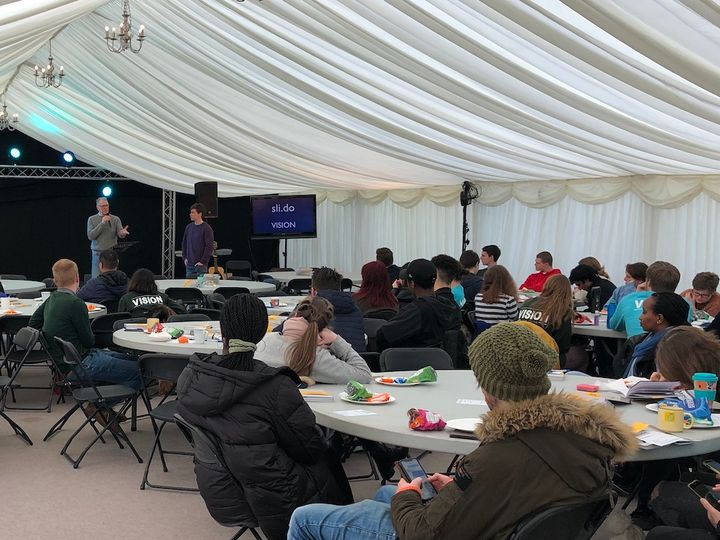
It can be really helpful to include a question time during each event:
- It bridges the gap between the talk ending and conversations beginning
- It shows that the gospel is publicly defensible
- It enables people to ask questions that they have
- It trains Christians in how to respond well to questions
Taking Questions
- Online — Applications like slido.com or pigeonholelive.com have the advantage of allowing people to ask questions anonymously, if they wish. They also allow everyone to interact with the questions by voting on them - helping you determine which questions are most popular, so you can give them priority.
- Verbally — You may also want to allow people the opportunity to put their hands up and ask their questions verbally - this can be more engaging, and shows we are confident to respond to any questions.
Asking and Answering Questions
- Let people know at the start that there will be time for questions, and give information on how people can ask them. It can also be helpful to have a QR code on the corner of the screen, or on the tables, so that people can submit questions as the talk is in progress.
- If you have two or more speakers for the week, then why not consider having a panel involving them all, for each Q&A? This can be especially helpful, particularly if you have both male and female speakers.
- Decide how long you will have for the questions. We would suggest not less than 10 minutes, or you won’t have time to deal with many, and guests will feel shortchanged. Equally, not so long that people get tired, and lose interest. 10-20 minutes is ideal.
- Explain that you won’t necessarily have time to deal with all the questions submitted, and that you won’t necessarily take them in order — but that you will try to deal with the most popular ones. This gives you freedom to be flexible, group questions together and finish on the strongest question. (If you just take them in order, then you will end with the least popular question!)
- For questions submitted online, it is best for the hosts to read out the questions to the speaker.
- If you are taking questions from the floor, then alternate this with the other questions. This stops one person from dominating the time, and also, helpfully, keeps you moving around different parts of the topic, rather than getting stuck on one particular line of questioning.
- If possible, finish with a question that gives the speaker an opportunity to get back to the centre of the topic, and to the heart of the gospel. Listeners will most remember what they heard last.
- Finish on time — better to leave people wanting more than having people lose interest.
- When you read the last question say, ‘This is our last question / the last question we have time for’, so that the speaker knows that this is the final thing they are going to say!
- If you didn’t get through all the questions, then explain that this is not because you are trying to avoid any of them, but simply that you have run out of time. The speaker will hopefully we willing to stay around and respond to further questions personally.
- Encourage people to continue to ask and discuss round the tables.
Things to do:
- Plan. Decide how you will receive questions and set a time for questions as you plan your event.
- Hosts. Brief hosts, so that they know how to run the question time.
- Communicate. Discuss plans with the speaker so they are aware of how the question time will run.